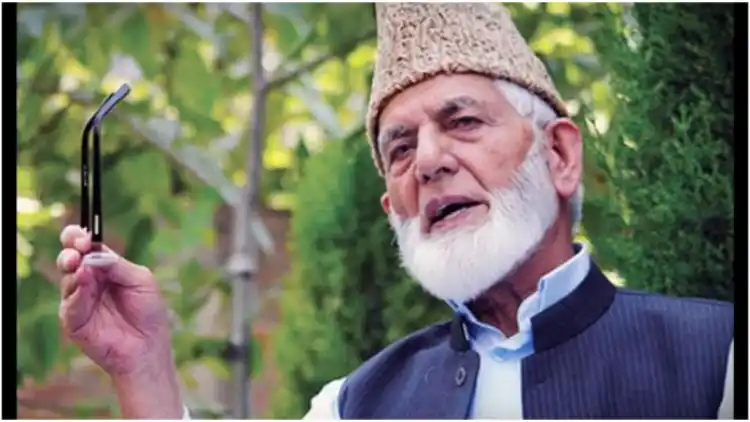When Ali Shah Geelani was buried in the Hyderpora cemetery on Srinagar outskirts in the early hours Thursday, his last wish was honoured: he had died as a pro-Pakistani Kashmiri leader.
In the last few years of his life, Geelani’s state of health was a mystery. The firebrand pro-Pakistani leader that he was, Geelani was nither seen nor heard in public. He had lost cognitive power and had no idea that Pakistan has conferred on him its highest civilian award Nishan-e-Pakistan or that the genie of Islamic terrorism that he had let out of the bottle on Kashmiris had lost its way.
As a young reporter, I saw Geelani speaking up in the Jammu and Kashmir Legislative Assembly of which he was a member for three terms. As an elected member of the Jamat-e-Islami, he would demand change in the syllabi of science for schools. He was opposed to Darwin’s theory of evolution. “How can we teach children that man is the descendent of the Ape.. this is anti-Islamic.” It was his favorite question that always provoked chief minister Farooq Abdullah into giving him a science lesson.
As an MLA and a politician, Geelani came across as an Islamic-minded and soft-spoken leader yet Pakistan was nowhere in his mind.
The situation changed in 1989 with the eruption of the Pakistan-backed militancy in Kashmir. Islamabad asked Kashmiri leaders like Geelani to join hands to make an amalgam - the All Parties Hurriyat Conference, APHC – to be the political voice of the young Kashmiri who had picked gun for ‘azadi.’ Geelani was never comfortable with the rest of the Hurriyat leaders. Others saw him as ‘Islamabad’s favourite and a mole whose job was to report about others to the big brother in Islamabad.” Others felt caged with him.
Geelani came under an open attack from all sides after a senior Hurriyat leader Abdul Ghani Lone (Father of the former J&K minister Sajjad Ghani Lone) was assassinated in a public rally of the Hurriyat by the Jamat-guided Hizbul Mujahideen killers.
It eventually led to a split of the APHC into a moderate faction led by Mirwaiz Moulvi Umer Farooq and the hawkish one by Geelani.
Geelani called his body Tehreek-e-Hurriyat-Kashmir. Initially, his equation with Islamabad was good but gradually it deteriorated as the ISI was upset with his haughtiness. His verbal spat with Pakistan President General Pervez Musharraf during the latter’s Delhi visit became the talk of the town in Kashmir. Jamat too dissociated itself from Geelani; they too found his rigidity was too much to for them to tolerate.
Not many know that Geelani was down with cancer of the kidney and his health was deteriorating in Ranchi jail where he was under detention in 2004. Thanks to the Government of India’s generosity, he was operated upon in AIIMS, New Delhi, at the public expense. He recovered fast and launched a campaign to mobilize Kashmiri youth into an ‘Islamic movement’ that eventually helped Pakistan revive the insurgency in Kashmir. Geelani’s campaign radicalized lakhs of young Kashmiris and the impact of it is still being felt in the Valley.
He gave a clear message to the youth: follow Islam and sunnat in all ways of life; fight against anti-Islamic forces – secularists, communists, democrats, etc.,- and seek the right to self-determination, a euphemism for Kashmir’s merger with Pakistan.
However, as the security forces launched an operation all out against the terror, young Kashmiris were dying every day in big numbers. Geelani and others in the Hurriyat faced uncomfortable questions from people. Why their children were not part of the ‘movement?’ Geelani’s sons from his two marriages were well-educated and well-placed in jobs. One of his grandsons was favoured for a coveted government job in Srinagar by the Mufti government, raising a furore.
Some of his progeny have joined media in Turkey as part of the ISI’s plan to continue its anti-India campaign from the soil of Europe. They are likely to be settled there in due course of time and would live a goofd life in Europe.
Questions were also raised over the huge houses and properties amassed by the Hurriyat leaders including Geelani’s sons and daughters over the years.
In his last days, Geelani was a pale shadow of himself; he had fallen from the high pedestal that he once stood on. He leaves behind no legacy, not even an organization to carry on his ideas; and his only greatness was that his heart kept beating for Pakistan till his end.

